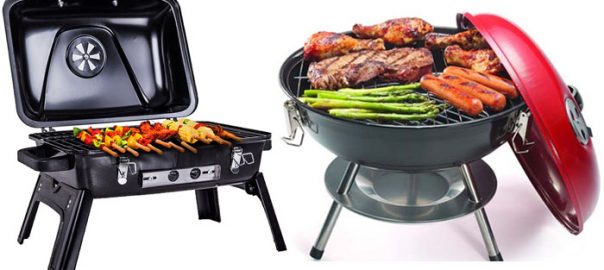
Charcoal vs. Propane, What’s Best?
BBQ Masters – Grilling with Propane or with Charcoal – Which is Better?
Summer is now in full swing, and grills around the country are fired up and furiously cooking up burgers, dogs, steaks, chicken, and more. Backyard grilling is one of the simple pleasures of life, and a favourite pastime of Canadians from coast to coast.
However, although we can all agree that barbecuing is a great way to cook, there is some debate on which type of grill is truly the best. Should you spend your cash on a propane gas barbecue, or a classic charcoal-fueled grill? While both have their advantages, each grill master will need to make their own choice based on how they prefer their grill to work and their food to taste.
In this article, we’re going to break down the essentials you need to know on how to choose between propane gas or charcoal for your backyard grill, as well as the different pros and cons of each type of grill. Let’s get right in to it!
About Propane Gas Grills
Propane grills are the most common type of barbecue that you’ll find in backyards and on patios all over Canada. They are available in all sizes, from compact gas grills that can be used for camping, up to massive 5- or 6-burner behemoths that can cook up massive amounts of food for large gatherings.
These grills use a tank of liquid propane as their fuel. The liquid propane turns to gas as it exits the tank and flows through the pipes of the grill, before being ignited as it exits the burners of the grill. Most propane grills use a battery-operated electric starter for easy one-touch ignition.
Although propane is the most common gas used for grilling, natural gas can also be used. Most modern grills can be converted to use natural gas and connect directly to the gas line of your home. This means you are always ready to grill and never run out of gas.
Why Choose a Propane Grill?
Propane gas grills have many advantages, which is why they are so common and popular. They’re easy to use and heat up quickly, which means that you can get the food cooking right away. For grill masters who want to spend more of their time cooking and less time waiting for the grill to heat up, propane is the way to go.
Grilling on a propane barbecue is quite easy, and the ability to quickly adjust the heat means that you can have plenty of control over the consistency of your cooking. You can dial the heat up or down independently for each burner, which means you can have one side hotter than the other for different foods to cook simultaneously.
Propane grills are relatively easy to clean and maintain as well. You’ll need to regularly brush the grills and clean or replace the grease drip tray, as well as inspect the gas lines and connections from time to time.
The propane used to fuel these grills is readily available, and can be obtained at most hardware stores, gas stations, and even supermarkets. When getting your tank refilled, the employee will check the date stamp on the tank and inspect it to ensure it is still safe and in proper working order. If it doesn’t meet these requirements, they will offer to replace the tank with a new one for a fee and will dispose of your old one for you. A new propane tank, which is usually sold empty and will need to be filled, runs about $50 for a standard 20lb tank.
Disadvantages of Gas Grills
Although propane gas grills are the most common and popular type of grill right now, they are not without some disadvantages. For example, while you can purchase smoker boxes for gas grills, they are generally not as efficient or effective at infusing different smoky flavours in to your food as a true smoker or charcoal grill would be.
In addition, dealing with propane tanks can be frustrating if you’re grilling a lot and need to head to the refill station often. Your average refill cost for a 20lb tank is usually around $15-$20, which can add up fast over the course of a summer.
Initial setup and building of a gas grill can take a fair amount of time as well. Although many retailers will offer to build it for you at no cost, if you take the initiative to build it yourself you can expect to spend at least a couple of hours getting everything unpacked, sorted, and assembled before you are ready to cook.
About Charcoal Grills
Many of us will undoubtedly have fond memories of summer cookouts from our childhood, where the highlight of the meal was always a burger full of rich, smoky flavour, hot off a charcoal barbecue. For a lot of grill masters, this nostalgia for simpler times and big flavours have driven their dedication to charcoal grills.
Charcoal grilling isn’t much more work than using propane, but there is definitely a technique that you’ll develop the more you do it. Getting the right timing on when to start the grill and how long to heat it up is essential, but once you do it a few times it gets easier.
Charcoal grills work by laying a layer of charcoal chunks in the base of the barbecue and igniting them. The charcoal is allowed to burn and heat up for a period of time in order to get the cooking surface up to the right temperature.
To ignite the charcoal, we recommend using a chimney starter. These special devices are specially designed to make it fast and easy to light charcoal without the need for lighter fluid, which can leave an unpleasant taste in the food. With a chimney starter you’ll never need to use lighter fluid again, so your grilling experience will be safer, and your food will taste better.
Why Choose a Charcoal Grill?
Using a charcoal barbecue will ensure that the foods you cook have a very distinctive flavour which comes from the smoke circulating around the food. This flavour can easily be changed or altered using different types of charcoal or adding special wood chips, such as Applewood or hickory.
The cost of charcoal can vary, anywhere from $5 for a small bag up to $20 for a bigger bag of premium charcoal. Lump charcoal tends to be the preferred choice for experienced grillers, while briquettes are slightly less expensive.
Maintaining a charcoal grill is quite simple, and usually just requires that you keep the grill grates clean by brushing them regularly, and that the ashes from the charcoal are removed and disposed of safely. Occasionally inspecting the whole grill is also a very good idea to check for any other wear and tear.
Disadvantages of Charcoal Grills
Although cooking with charcoal can be learned quite easily, the process of grilling with charcoal is still more complex than simply using propane. It requires more attention to the heat in the grill, as hot spots and cold spots can develop depending on the thickness and consistency of the charcoal layer. If you’re not careful and attentive, you could end up with some food over-cooked, and some food under-cooked.
In addition, while the smoky taste associated with charcoal grills is a big selling feature for many people, there are some instances where it can overpower the taste of some types of foods. Whatever goes on to a charcoal grill will inevitably come off with a smoky flavour, so it’s important to be aware of that when you’re planning your meal.
Which type of grill should you choose for your backyard?
Now, we’ve come to the big question; Which is better, charcoal or propane? To be perfectly honest, the answer is both and neither. Charcoal and propane are both great ways to grill, and each have their distinct advantages. Ultimately, the best choice for your backyard depends on your own desires and needs.
Do you want a grill that’s very easy to use, convenient & predictable when cooking? Then we’d recommend going with propane.
Do you like to experiment with different flavours and get creative with your food? You sound like a charcoal person.
After You Choose Your Grill
Once you find the type of grill that suits your personality and cooking style, we’ve got plenty of other resources that you can use to find amazing delicious low carb recipes to test out your new grill and hone your skills.
We’ve got recommendations for cool bbq gadgets, great summer grilling recipes, guides for cleaning your grill, and even ideas for making your own marinades and sauces.
Whatever type of grill you end up with, we hope that it helps bring you and your family plenty of good times and great food!






